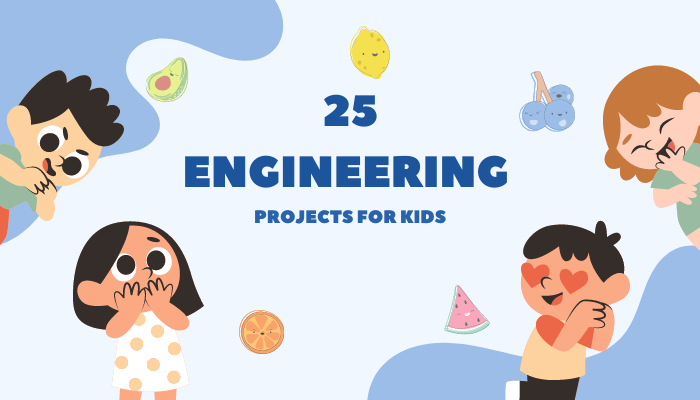Engineering projects can be an excellent way for kids to learn about the principles of science, technology, engineering, and mathematics (STEM) in a fun and engaging way. These activities not only introduce young minds to basic engineering concepts but also encourage problem-solving, critical thinking, and creativity. Below are 25 engineering Fun engineering projects kids projects tailored for kids, each designed to ignite curiosity and foster a love for learning and innovation.
1. Simple Machines with LEGO
Utilize LEGO bricks to build simple machines like levers, wheels axles, and pulleys. Kids can learn about basic physics principles while constructing their own imaginative machines.
2. Homemade Catapults
A project that teaches kids about energy, motion, and engineering design by building catapults from popsicle sticks, rubber bands, and spoons. Experiment with different designs to see which catapult can launch small objects the farthest.
3. Egg Drop Challenge
A classic engineering challenge that prompts kids to design a device or container that can protect an egg from breaking when dropped from a certain height. This project encourages creative thinking and problem-solving.
4. Paper Bridge Building
Challenge kids to build a bridge using only paper and tape that can support the weight of a set number of coins. This introduces principles of structural engineering and material strength.
5. DIY Solar Oven
Using a pizza box, aluminum foil, and plastic wrap, kids can build a simple solar oven. This project teaches about renewable energy, the greenhouse effect, and the principles of solar heating.
6. Water Filtration System
Create a basic water filtration system using materials like sand, gravel, and activated charcoal. Kids learn about environmental engineering and the importance of clean water access.
7. Straw Roller Coasters
Using straws, tape, and paper, kids can design and build their own roller coasters. This project teaches about gravity, momentum, and the engineering design process.
8. Wind-Powered Cars
Build cars powered by wind using recycled materials and a small fan or natural wind. This introduces kids to alternative energy sources and aerodynamics.
9. Bristlebots
Create simple robots using toothbrush heads and tiny motors. This project introduces kids to robotics and the basics of electric circuits.
10. Balloon-Powered Boats
Using balloons, straws, and recycled materials, kids can build boats that are powered by the air escaping from a balloon. This teaches about Newton’s third law of motion in a fun way.
11. Homemade Flashlight
Construct a simple flashlight using a circuit with a switch, battery, and LED light. This introduces kids to basic electronics and the concept of electrical circuits.
12. Cardboard Automata
Create moving mechanical sculptures using cardboard, skewers, and cams. This project teaches mechanical engineering principles and encourages artistic expression.
13. Rubber Band Helicopters
Build a helicopter model powered by a rubber band. This project helps kids understand aerodynamics and rotational motion.
14. Soda Bottle Rockets
Using baking soda and vinegar, kids can launch a rocket made from a soda bottle. This fun activity teaches about chemical reactions and propulsion.
15. Penny Battery
Construct a simple battery using pennies, paper towels soaked in vinegar, and salt. This project introduces kids to the basics of chemistry and electrical circuits.
16. Marble Run Challenge
Using materials like cardboard tubes, popsicle sticks, and tape, kids can design and build a complex path for a marble to travel. This encourages spatial reasoning and understanding of motion.
17. DIY Periscope
Build a periscope using cardboard, mirrors, and tape. Kids learn about light reflection and how periscopes work.
18. Stomp Rockets
Create rockets that can be launched by stomping on an empty plastic bottle, teaching kids about forces and motion in an interactive way.
19. Tin Can Phones
Explore the science of sound by creating a simple communication device using tin cans and string. This project teaches about sound waves and how they travel.
20. Electromagnet Experiment
Construct an electromagnet using a nail, wire, and a battery. Kids can explore magnetism and electricity by seeing how many paper clips their electromagnet can pick up.
21. Simple Circuit Projects
Introduce kids to electronics with simple circuits that can power a lightbulb or sound a buzzer using batteries, wires, and switches.
22. Paddle Boat
Design and build a paddle boat using recycled materials. This project introduces kids to concepts of buoyancy and propulsion.
23. Weather Station
Create a simple weather station with instruments like a rain gauge, anemometer, and thermometer to learn about meteorology and the environment.
24. Structural Challenges
Using spaghetti and marshmallows or toothpicks and gumdrops, kids can attempt to build the tallest structure or a bridge that can hold the most weight, learning about stability and structural integrity.
25. Coding with Scratch
Introduce kids to the basics of computer programming by creating simple games, animations, or stories with Scratch, a visual programming language designed for beginners.
Conclusion
Engineering projects for kids offer a world of exploration and creativity, allowing them to apply scientific principles in practical, hands-on ways. By engaging in these activities, children not only learn about engineering but also develop valuable skills in problem-solving, critical thinking, and innovation. As they build, create, and experiment, they gain confidence in their abilities to understand and interact with the world around them, jobs laying the foundation for a lifelong interest in STEM fields.




